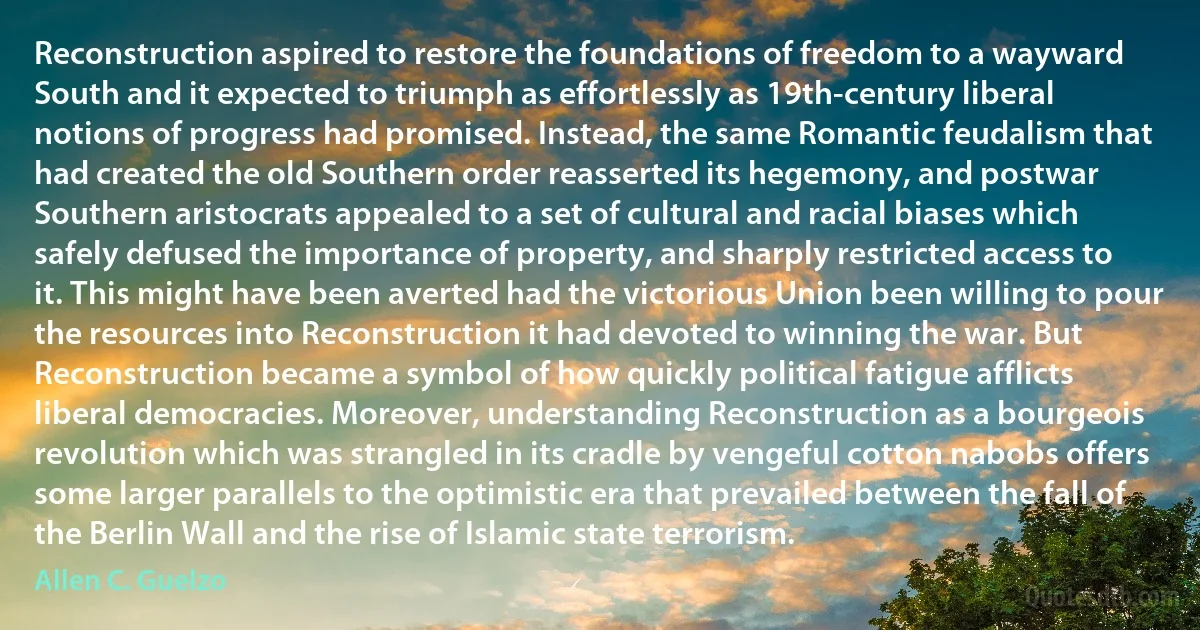
Reconstruction aspired to restore the foundations of freedom to a wayward South and it expected to triumph as effortlessly as 19th-century liberal notions of progress had promised. Instead, the same Romantic feudalism that had created the old Southern order reasserted its hegemony, and postwar Southern aristocrats appealed to a set of cultural and racial biases which safely defused the importance of property, and sharply restricted access to it. This might have been averted had the victorious Union been willing to pour the resources into Reconstruction it had devoted to winning the war. But Reconstruction became a symbol of how quickly political fatigue afflicts liberal democracies. Moreover, understanding Reconstruction as a bourgeois revolution which was strangled in its cradle by vengeful cotton nabobs offers some larger parallels to the optimistic era that prevailed between the fall of the Berlin Wall and the rise of Islamic state terrorism.
Allen C. GuelzoRelated topics
berlin bourgeois cradle era fall feudalism freedom hegemony might order pour property racial reconstruction restore revolution rise romantic set state understanding wall war willing winning islamicRelated quotes
I wasn't really shocked or anything. Because of what I saw after the incident after the NFC championship game. You've got a lot of racial backlash, and a lot of racist comments that were uncalled for – I can never see a time where racism is called for. So it didn't shock me as much as it would have had I not experienced that personally, had I not seen those things. Because it showed me that America still had some progress to make. On equality, and understanding that it doesn't matter what color you are, you treat people as people. And whether a good person or a bad person, you don't judge them off the color of their skin. You can know a person is a good person or a bad person by who they are, not by what they look like. In that situation, it just seems like a lot of people gave him a lot of flack, well deserved, but you know – I feel like a lot more people were surprised then they should have been.

Richard Sherman (American football)
...Hades had opened its gates and vomited forth the basest, most despicable, most horrible demons. In the course of my life I had seen something of untrammeled human insights of horror of panic. I had taken part in a dozen battles in the First World War, had experienced barrages, gassings, going over the top. I had witnessed the turmoil of the postwar era, the crushing uprisings, street battles, meeting hall brawls. I was present among the bystanders during the Hitler Putsch in 1923 in Munich. I saw the early period of Nazi rule in Berlin. But none of this was comparable to those days in Vienna. What was unleashed upon Vienna had nothing to do with [the] seizure of power in Germany. ...What was unleashed upon Vienna was a torrent of envy, jealousy, bitterness, blind, malignant craving for revenge. All better instincts were silenced... only the torpid masses had been unchained. ...It was the witch's Sabbath of the mob. All that makes for human dignity was buried.

Carl Zuckmayer
The strength of Soviet patriotism lies in the fact that it is based not on racial or nationalistic prejudices, but on the peoples' profound loyalty and devotion to their Soviet Motherland, on the fraternal partnership of the working people of all the nationalities in our country. Soviet patriotism harmoniously combines the national traditions of the peoples and the common vital interests of all the working people of the Soviet Union. Far from dividing them, Soviet patriotism welds all the nations and peoples of our country into a single fraternal family. This should be regarded as the basis of the inviolable friendship of the peoples of the Soviet Union which is growing ever stronger. At the same time the peoples of the U.S.S.R. respect the rights and independence of the peoples of foreign countries and have always shown themselves willing to live in peace and friendship with neighbouring states.

Joseph Stalin
From the beginning while we were engaged in these issues, I said in interviews with those who came from abroad, even in Najaf or Paris or among my personal words, I have always said that clerics have an occupation which is more important than these executive jobs, and should Islam become victorious, clerics would dedicate themselves to their own occupation. But as we went on with the revolution, we found out that if we tell all clerics to go after their mosques, this country would fall into the throat of America and Soviet Union. We experienced and saw, those who took the lead but were not clerics, even though some of them were religious people, our revolutionary path was not according to their taste, therefore... we temporarily deviate from our original word until this country could be administered by those other than clerics, then clerics will go back to their preach and their own position and they will leave executive matters to others who work for Islam.

Ruhollah Khomeini
Leninism is Marxism of the era of imperialism and the proletarian revolution. To be more exact, Leninism is the theory and tactics of the proletarian revolution in general, the theory and tactics of the dictatorship of the proletariat in particular. Marx and Engels pursued their activities in the pre-revolutionary period (we have the proletarian revolution in mind), when developed imperialism did not yet exist, in the period of the proletarians' preparation for revolution, in the period when the proletarian revolution was not yet an immediate practical inevitability. But Lenin, the disciple of Marx and Engels, pursued his activities in the period of developed imperialism, in the period of the unfolding proletarian revolution, when the proletarian revolution had already triumphed in one country, had smashed bourgeois democracy and had ushered in the era of proletarian democracy, the era of the Soviets.

Joseph Stalin
